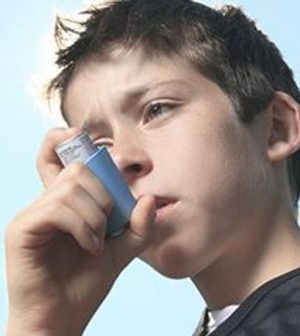- Could Your Grocery Store Meat Be Causing Recurring UTIs?
- Are You Making This Expensive Thermostat Error This Winter?
- Recognizing the Signs of Hypothyroidism
- 10 Strategies to Overcome Insomnia
- Could Artificial Sweeteners Be Aging the Brain Faster?
- Techniques for Soothing Your Nervous System
- Does the Water in Your House Smell Funny? Here’s Why
- Can a Daily Dose of Apple Cider Vinegar Actually Aid Weight Loss?
- 6 Health Beverages That Can Actually Spike Your Blood Sugar
- Treatment Options for Social Anxiety Disorder
Asthma, Lower Grades, Homelessness: How Climate Change Will Harm America’s Kids

Children are uniquely vulnerable to the effects of climate change, a new report from the U.S. Environmental Protection Agency (EPA) shows.
Climate change can affect learning, physical health and housing security, which can last throughout the child’s life, according to the report.
“Understanding health risks to children is critical for developing effective and equitable strategies that will protect our current and future generations,” EPA administrator Michael Regan, said in an agency news release. “Today’s report will help further efforts being taken by the Biden administration across the federal government to address the climate crisis and advance environmental justice.”
The report, released Tuesday, looks at health effects associated with extreme heat, air quality, changing seasons, flooding and infectious diseases.
The analysis also considers the extent that these health effects may disproportionately impact children who are Black, Indigenous and people of color, low income, without health insurance and/or have limited English proficiency.
“EPA’s new report offers a clear, compelling overview of how climate change impacts our children’s health. Its findings underscore the necessity of considering children’s well-being in every climate policy — and the moral urgency of taking effective action to stop climate pollution on behalf of younger and future generations,” Moms Clean Air Force senior policy analyst Elizabeth Bechard said in the EPA news release.
“We know that children are especially vulnerable to nearly all of the health impacts of climate change, from extreme heat and worsened air quality to coastal flooding and increased prevalence of insect-borne diseases. The new report is painful to read. But necessary,” Bechard added.
The report found that climate-driven changes in air quality would increase annual asthma cases between about 4% and 11%. Increases in oak, birch and grass pollen are projected to increase children’s asthma-related emergency department visits from 17% to 30% each year.
Meanwhile, cases of Lyme disease in children are projected to rise 79% to 241%, with an additional 2,600 to 23,400 new cases per year.
Climate-driven temperature increases are projected to result in 4% to 7% reductions in annual academic achievement per child, as classrooms get hotter. Learning losses like this can affect future income and lead to thousands of dollars lost by each individual annually.
Without any efforts to adapt to what’s expected, about 1 million to 2 million or more children could experience temporary home displacement or complete home loss because of coastal flooding.
The EPA characterized the report is an important new resource in the Biden administration’s efforts to address the climate crisis and advance environmental justice.
“We applaud the EPA for this important leadership and will continue to identify ways to collaborate to advance the health of all children from the growing and urgent threat of climate change,” said Children’s Environmental Health Network executive director Nsedu Obot Witherspoon.
More information
The World Health Organization has more on climate change and health.
SOURCE: Environmental Protection Agency, news release, April 25, 2023
Source: HealthDay
Copyright © 2026 HealthDay. All rights reserved.










